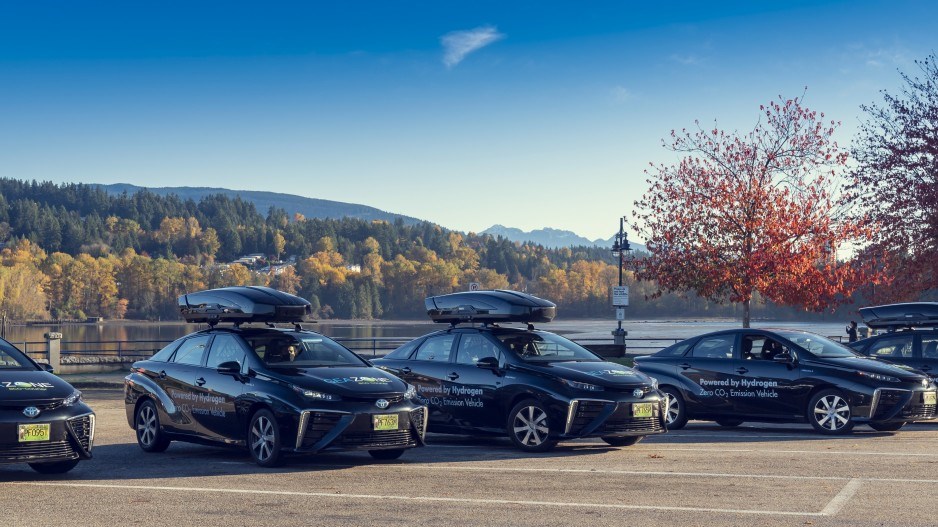A Victoria-based courier service is expanding its fleet of zero-emission vehicles (ZEVs), this time opting for hydrogen-powered vehicles rather than the more common battery-electric vehicles.
Geazone Strategic Ecopreneur Group Inc. said Monday it plans to build a 40-car fleet of fuel-cell electric vehicles, marking what it calls a first for North American courier services.
While charging stations for traditional electric vehicles are fairly ubiquitous across the province — ranging from public stations to plug-in options in private homes — only four hydrogen fuelling stations have launched in B.C. Another 10 are planned for the coming years via $10 million from taxpayers.
But Geazone is receiving provincial government rebates under a program focused on hydrogen-powered vehicles, which offers fleet operators $8,000 up to a maximum of 35% the selling price of a fuel-cell electric vehicle.
To date, the company has purchased nine of the Mirai models from auto giant Toyota Motor Corp. (TYO:7203) and has secured $72,000 in rebates from the province.
Geazon ultimately plans to build a fleet of 40 such vehicles.
EV expert Matthew Klippenstein, a regional manager with the Canadian Hydrogen and Fuel Cell Association, told BIV following the announcement that the prospect of new fuelling stations coming online makes launch of the fleet “terrifically exciting.”
Last month the provincial government unveiled its new CleanBC plan, which aims for 100% of new passenger vehicles sold in B.C. to be ZEVs by 2035.
Those ZEVs may either be battery-electric or hydrogen-powered electric vehicles.
“Incentives can help,” Klippenstein told BIV in October.
“There is also the matter of the zero-emissions vehicle mandate.”
Prior to last month’s unveiling of the CleanBC plan, the province was trailing other jurisdictions when it came to ZEV mandates.
The administration of President Joe Biden wants ZEVs to account for 50% of new vehicle sales in the U.S. by 2030, but B.C.’s 2019 legislation aimed for just 30% by that same year. The province’s new mandate now aims for 90% of new vehicle sales to be ZEVs by 2030.
Meanwhile, Ottawa’s newest targets, announced in June, call for ZEVs to represent 100% of new vehicle sales by 2035. That aligns with the province’s recent announcement.
And as ZEV mandates put additional pressure on manufacturers in the coming years, B.C. firms have been announcing plans over the past few months to shoulder part of the burden.
Vancouver-based ElectraMeccanica Vehicles Corp. (Nasdaq:SOLO) revealed in March that it had selected Mesa, Arizona, as its home base for manufacturing in North America.
The American plant is expected to begin producing the distinctive three-wheeled, single-passenger Solo vehicles next year, and the company already has one manufacturing facility in China.
Electric-motorcycle maker Damon Motors Inc. officially broke ground last month on its manufacturing hub in Surrey, where up to 40,000 motorbikes are expected to be produced annually once the plant opens in about a year’s time.




